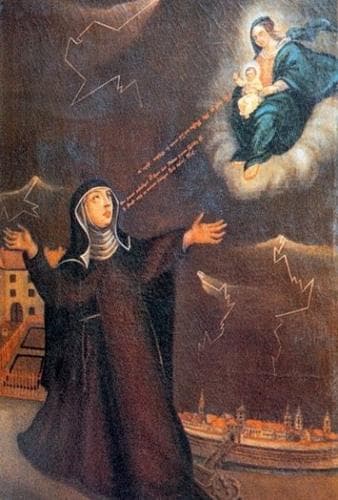
Blessed Ursula Haider
Blessed
Feast Day: January 20
Death: January 20, 1498
Biography
Blessed Ursula Haider, also known as Ursula of Leutkirch and Ursula of Villingen, was born in 1413 in Leutkirch, Allgáu, Swabia, which is located in modern-day Baden-Württemberg, Germany. Unfortunately, she was orphaned at a young age and was raised by her maternal grandmother and her uncle, Father Johannes B√∂r.
At the age of 9, Ursula moved to the Franciscan monastery of Reute at Bad Waldsee, Germany, to receive an education. It was at Reute that she made her first Holy Communion and became the spiritual student of Blessed Elisabeth Achler. Inspired by her experiences at the monastery, Ursula felt a calling to the religious life.
Upon returning home at the age of 17, Ursula turned down several marriage proposals and dedicated her time to finding the right monastery to enter religious life. Finally, on July 29, 1431, she entered the Poor Clare convent of Valduna in Vorarlberg, which is now part of modern Austria. At Valduna, Ursula dedicated herself to caring for the sick, with a particular focus on cancer patients.
After many years of faithfully serving at Valduna, Ursula received a prophetic message in 1465 that she would die in Villingen, a place she had never heard of before. In an unexpected turn of events, on January 25, 1480, Pope Pius VI ordered Ursula to go to Villingen in the Black Forest region of Germany to take over and reform the Poor Clare monastery there.
Ursula, along with seven of her Franciscan sisters, set out for Villingen on April 18, 1480. On April 29, 1480, they officially took over the monastery of Saint Klara in Villingen. Under Mother Ursula's guidance, the monastery flourished despite initial challenges. The house garnered a reputation for its piety, choral prayer, high-quality needlework, herbal medicines, and baked goods.
One notable event occurred during a tremendous storm when Ursula's fervent prayers and willingness to offer herself in place of the townspeople led to a vision of the Blessed Virgin Mary and the Infant Jesus. This vision blessed the town of Villingen, saving it from the storm's devastation. From that time onward, the Psalms were recited at the cloister each Lent in commemoration of this miraculous protection.
In 1489, due to her declining health, Ursula stepped down from her role as abbess. She spent her remaining years as a prayerful sister and frequently found herself in and out of the hospital. Ursula diligently kept a written record of her life, visions, and insights into the faith. Unfortunately, this document has been lost over time.
Blessed Ursula Haider passed away on January 20, 1498, in Villingen, Germany, at the age of 84 from natural causes. She was interred in the church of the Bicken monastery in Villingen. However, in 1701, when the church underwent remodeling, her remains were moved and re-interred beside the altar of the same church.
Although no official feast day or canonical veneration has been assigned to Blessed Ursula Haider, her life serves as an inspiring example of devotion and selfless service to others. Her humble beginnings, dedication to the sick, and successful reform of the Poor Clare monastery in Villingen leave a lasting legacy of faith and compassion.